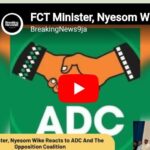Moves to Unseat Tinubu Began Just 6 Months Into His Presidency

According to insider sources and political observers, efforts to undermine the Tinubu presidency began taking shape just six months after he was sworn in. These early moves, while not immediately visible to the public, have since evolved into a broader coalition of discontented political figures, interest groups, and former allies who feel alienated by the administration’s direction.
Rising Discontent Among the Political Class
Several key developments reportedly triggered the early opposition. Among them was the president’s economic reform agenda, particularly the removal of fuel subsidies and the floating of the naira—moves that caused immediate hardship for many Nigerians. While these steps were praised by some international observers for their long-term economic rationale, they drew criticism from political stakeholders who feared the public backlash could erode their own influence.
“Many of those who supported Tinubu expected a seat at the table,” said a political analyst familiar with developments in the ruling All Progressives Congress (APC). “But as appointments rolled out and policies took shape, it became clear that not everyone’s expectations were being met.”
The Emergence of a Shadow Coalition
By the end of 2023, political meetings—some informal, others more structured—began surfacing in Abuja and other political centers. Former governors, lawmakers, and party stalwarts who had grown dissatisfied with the administration reportedly began holding talks about ways to “rescue” the country from what they described as “a failing leadership.”
Though no formal opposition bloc had declared its intention to unseat the president, the formation of loose alliances among political heavyweights suggested deeper undercurrents at play. The goal, insiders suggest, wasn’t necessarily an immediate overthrow, but rather the slow erosion of Tinubu’s political capital ahead of future elections or legal challenges.
Internal and External Pressures
In addition to internal party unrest, civil society groups, labor unions, and opposition parties have also ramped up pressure on the government. Protests over the rising cost of living and fuel price hikes have added to the perception that the government is losing its grip on public trust.
Despite the mounting criticism, President Tinubu has remained defiant, urging Nigerians to be patient and describing his policies as painful but necessary for long-term recovery. In several public statements, he has dismissed rumors of internal betrayal, emphasizing unity and national interest.
Looking Ahead
If the early moves to unseat Tinubu continue to gain traction, Nigeria may be heading toward a period of intensified political turbulence. While it’s not uncommon for Nigerian presidents to face opposition, the speed and scale at which dissent has reportedly emerged under Tinubu suggest that the next few years will test not only his leadership but also the resilience of Nigeria’s political system.
For now, the president remains firmly in power. But as alliances shift and political strategies evolve, the coming months will be critical in determining whether Tinubu can consolidate his authority—or whether the seeds of dissent planted early in his presidency will take
deeper root.
TRENDING SONGS
 NNPC Boss Ojulari Bags UK Energy Institute Fellowship
NNPC Boss Ojulari Bags UK Energy Institute Fellowship
 Shock in Anambra: Bride Disappears Moments Before Wedding
Shock in Anambra: Bride Disappears Moments Before Wedding
 Nigerian Woman Returns ₦330 Million Accidentally Credited to Her Account
Nigerian Woman Returns ₦330 Million Accidentally Credited to Her Account
 APC Don Reach Morocco?’ VeryDarkMan Reacts to Seyi Tinubu Poster
APC Don Reach Morocco?’ VeryDarkMan Reacts to Seyi Tinubu Poster
 Bride Breaks Down in Tears as Wedding Meals Were Kept Secretly While Guests Go Home Hungry
Bride Breaks Down in Tears as Wedding Meals Were Kept Secretly While Guests Go Home Hungry
 Odogwu by Day, Robber by Night: How Marriage Joy Turned Into Tragedy
Odogwu by Day, Robber by Night: How Marriage Joy Turned Into Tragedy
 Nigerian Officials Allegedly Pocket N4–6B Weekly Through Smuggling Cartels at Seme–Badagry Border
Nigerian Officials Allegedly Pocket N4–6B Weekly Through Smuggling Cartels at Seme–Badagry Border
 Ahmad Yerima: Naval Officer to Face No Sanctions After Clash with Wike – Matawalle
Ahmad Yerima: Naval Officer to Face No Sanctions After Clash with Wike – Matawalle
 Trending Video: Muslim Man Joins Wife in Hallelujah Challenge ‘Dress Like Your Miracle’ Night
Trending Video: Muslim Man Joins Wife in Hallelujah Challenge ‘Dress Like Your Miracle’ Night
 Woman Seeks Advice as Late Brother’s Wife Refuses to Mourn Him Following His Death With Alleged Mistress
Woman Seeks Advice as Late Brother’s Wife Refuses to Mourn Him Following His Death With Alleged Mistress
Share this post with your friends on ![]()













